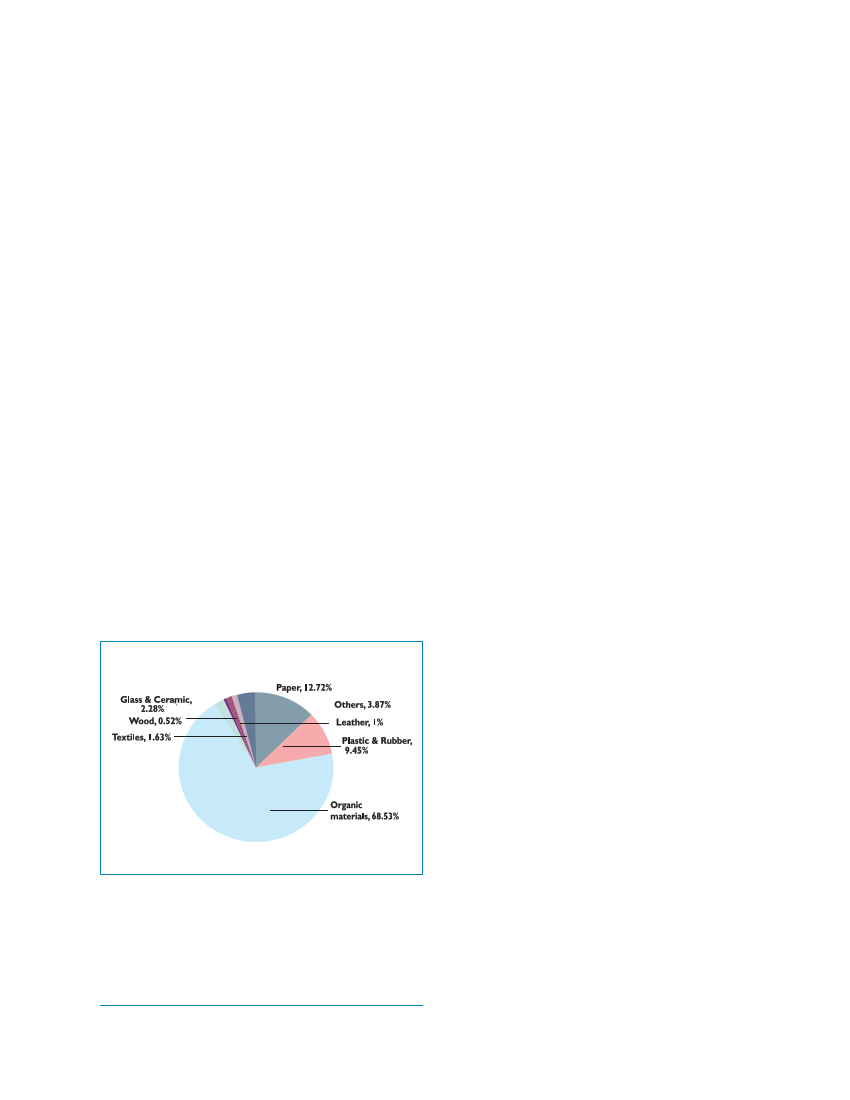
BEST PRACTICES ON SOLID WASTE MANAGEMENT OF NEPALESE CITIES
Waste generation and composition:
According to the data provided by the municipality and
the field survey conducted in May 2008, the average
HH waste generation rate in this municipality is 0.25
kg/person/day (Hetauda municipality, 2008 data). This
rate is same as the national generation rate and it is
lower than the waste generation rate of the capital
Kathmandu, which is 0.39 kg/person/day
(SWMRMC,2008 data). The daily waste generation of
Hetauda municipality is 14 tons (Hetauda municipality,
2008 data).
The composition of waste at source was found to be: paper
12.72 per cent, plastic & rubber 9.45 per cent, organic
waste 68.53 per cent, glass and ceramics 2.28 per cent,
wood 0.52 per cent, textiles 1.63 per cent, leather 1.00 per
cent and other materials 3.87 per cent (Hetauda
municipality, 2008). In order to reduce the amount of plastic
material in the waste, the municipality is encouraging
the use of durable textile bags instead of plastic bags.
According to UN-HABITAT Nepal, the generation rate
for hospital waste in Nepal is 1.72 kg/day/bed (UN-
HABITAT, KMC data, 2007). Therefore, it is estimated
that Hetauda municipality generates 86 kg of hospital
waste each day.
Chart 5: Composition of solid waste at source,
Hetauda municipality
Waste collection and recycling
Contractors are responsible for the collection (from
various unofficial collection points), transportion and
dumping of waste. Door-to-door collection from
residential and commercial areas is done using tricycles
that can carry 300 to 500 kg, operating in the morning
from 6.00 to 9.00 a.m. and from 1.00 to 5.00 p.m. in
the afternoon (Hetauda municipality, 2008 data).
Previously, metal containers had been used in order to
improve the efficiency of the collection operation.
However, the local people rejected this method of storage
because of the unpleasant smell coming from the
containers and the scattering of waste around the
container by animals. In order to encourage waste
reduction at source, community-based composting
facilities of 500kg capacity and suiro hooks for plastic
segregation have been promoted in Hetauda
municipality.
The municipality is actively promoting recycling and
composting at the HH level. It has distributed
composting bins to 400 HHs and also provided
regular training (Hetauda municipality, 2008 data).
A few years ago, Hetauda municipality banned the
use of plastic bags within the city premise. After
experiencing difficulties from the residents24 and
because of the complete ban on plastic bags, the city
has adopted the strategy of promoting reduction and
recycling of plastic bags. Hetauda municipality has
distributed wire Suiro hooks for segregating plastic
waste. Hetauda municipality encourages the recovery
of plastic by providing training at ward level by waste
inspectors25 and it also buys plastic at NRs.6 per kg
(Hetauda municipality, 2008 data). Local TLOs like
Navajiwan Jyoti Club have been promoting plastic
separation from the beginning of the waste
management programme. In order to encourage
citizens to recycle on World Environment Day 2008,
prizes worth NRs.1000 and certificates of appreciation
were awarded by Hetauda municipality to HHs that
made a big contribution towards recycling (Hetauda
municipality, 2008 data).
It is estimated that total of 15 per cent of both domestic
and commercial waste is recycled by composting and
at-source segregation, and that almost 60 per cent of
domestic and 25 per cent of institutional waste are
collected by the municipality each day (Hetauda
municipality data, 2008 data). However, solid waste
from the Hetauda industrial area is managed by the
companies themselves. During the field visit, no data
were provided about the waste generation of the Hetauda
industrial area. After composting, local people sell their
24 Difficulty in getting shopping bags
25 One waste inspector is allocated for each ward
25